Interview
The Hunger Stage: Jerk chicken, curry goat and roti – the people behind the food at Notting Hill Carnival
26 Aug 2022
7m
The streets of Notting Hill have sat quiet on the August bank holiday weekend for the last two years – no thumping sound systems, no colourful costumes, and no wafts of Caribbean food filling the air.
As a result of the Covid-19 pandemic, the second biggest celebration of Afro-Caribbean culture in Europe was forced to grind to a halt (or at least, reside online), and there’s no denying that the absence of such a joyous, unifying experience was felt by everyone in the community.
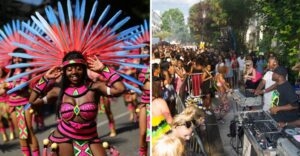
Notting Hill Carnival is back this year (Credit: Alamy)
You see, Notting Hill Carnival has taken place in the UK since 1959, when it was first held at St Pancras Town Hall. Spearheaded by Trinidadian activist Claudia Jones in response to racism being directed at the Windrush Generation who had settled in the area, Carnival was as much a defiant show of solidarity as it was an opportunity for London to celebrate Black culture.
It was a time for those who felt outcast to come together and share in familiar traditions and remains an opportunity for the whole community to show love and acceptance, through music, parades, and (of course), the very best Caribbean festival food.
You can imagine the excitement, then, about Carnival’s return this weekend.
As 2.5 million people prepare to descend across Westbourne Grove, Westbourne Park, Kensal Road and Ladbroke Grove over the next three days, we spoke to three people who have fronted some of the best Notting Hill Carnival food stalls over the years.
Here’s what the weekend means to them…
Mama’s Jerk – Adrian Luckie

Adrian Luckie fronts Mama’s Jerk (Credit: Mama’s Jerk)
Adrian Luckie, 51, fronts Mama’s Jerk, a Notting Hill Carnival street food OG, which has been serving Jamaican food to the masses since 2010, in honour of his great grandmother, Mama Charlotte.
She cooked her secret jerk recipe for the community in the parish of St Elizabeth during her lifetime, and three generations later, her legacy lives on in Adrian’s cooking today.
“Mama Charlotte was one of those early risers that got up when the cock crowed and was in the outside kitchen cooking away for lunch,” he says. “Those are some of my fondest memories [of her].
“That love of cooking got passed down to my grandmother and my mum. On Sundays, we’d go around to my grandmother’s house like most Caribbean, West Indian families and we’d eat, cook, clean, laugh, joke and drink. You know, food has always been a major part of our culture.”
Whilst those family members have sadly passed away now, trained chef Adrian uses the very same jerk recipe to serve what he dubs ‘modern Caribbean food’, like a ‘jerkurrito’ (which is rice, peas and jerk chicken in a wrap), jerk swordfish and jerk vegetarian bean cakes.
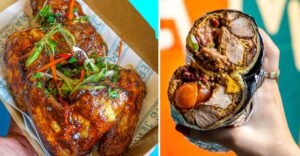
Adrian’s jerk recipe comes from his Mama Charlotte (Credit: Mama’s Jerk)
“I remember I went to my first Carnival at five or six, and there wasn’t as much [food]. I probably would have got a patty or something,” he says. “Then, as it got bigger you got some proper old school granddads who were the chefs…and there would be jerk pork and jerk chicken, freshly marinated, seasoned and slowly cooking.
“But over the years, I’ve seen the people that are coming to Carnival evolve, and today it’s one of the most diverse celebrations of Caribbean culture in the UK.
“I [like to think I’m part of] the new breed of operators who are just trying to jazz things up a little bit and get as many people trying Caribbean food as possible.”
Whether via his stall at Carnival over the years, his subsequent Canary Wharf outpost or the various pop-ups he attends across London, Adrian has certainly made his mark as one of the most exciting Caribbean chefs in the city today.
“I’m just proud. Proud that the food I’ve been brought up with and learnt from my great grandmother, my grandmother, my mum and my aunties is [so well received],” he says.
“Being able to sell my version of that to people, and seeing them loving it and coming back for more… it’s just been amazing.
“I’m feeding people today with the very same recipe Mama Charlotte used. It feels special to be recreating those happy memories”.
Heart and Soul Roti Specialists – Joanne and Valene Marcano
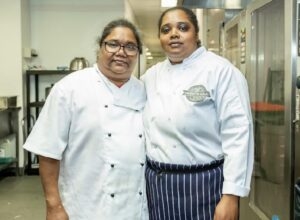
Joanne and Valene make up Heart and Soul Roti Specialists (Credit: Heart and Soul)
Mother and daughter Joanne and Valene Marcano (62 and 42) are the founders of Heart and Soul Roti Specialists, who are beloved for having served some of the best food at Notting Hill Carnival over the past decade.
Joanne moved to the UK from Trinidad aged 10, and after trading from a van outside performing arts venue The Tabernacle in the early noughties, she went on to cook rotis, salt fish, pholourie (a Caribbean finger food) and doubles (a Trinidadian street food) to large crowds at late night events in the area.
Inspired by the meals her mum and aunties would make her growing up – with a few modern tweaks from Valene – Heart and Soul’s authentic Caribbean street food soon became renowned amongst much of West London’s Caribbean community, and earned them the coveted opportunity to cook for the judges at Carnival.
“We started cooking in what was sort of the VIP area,” explains Joanne. “Then, everyone was so happy with the food that when they asked us again the following year, they let us have a stall so we could sell to the public, too.”
To this day, the mother, daughter duo still remember the support they received from punters when they set up shop – something that has remained unwavering every year.
“Everyone knew mum’s rotis,” says Valene, proudly. “They would look for us.”
“And a lot of the bands, like Chocolate [National] Mas… they knew me,” adds Joanne. “So they’d shout us out as they passed.”
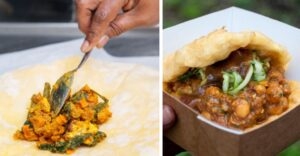
Joanne and Valene made Trinidadian food for the Carnival crowds (Credit: Heart and Soul)
There’s no denying Heart and Soul have clout amongst the Caribbean community, but they say Notting Hill Carnival has also offered them an opportunity to teach the wider population about Trinidadian food, too.
“I just think there’s nothing like bringing cultures together to bring communion with food,” says Joanne. “When you say Caribbean food to someone, they’ll often think of jerk, but what they don’t realise is there’s a whole array of islands in the West Indies that cook similar foods in different ways.
“For instance, we have quite a heavy Indian influence, because of the indentured servants at the end of slavery in Trinidad.
“We use curry [powder], we use cumin and we use green seasoning (a blend of lime, ginger, coriander, spring onions and peppers).
“[Trinidadian food is] a real melting pot of Indian, African and Spanish culture.”
Joanne still remembers going to Carnival as a kid, and thinking it “reminded her of home”.
“Since then, it’s just got bigger and bigger. It’s a different animal,” she adds. “But it still brings all the different [Caribbean] islands together, because you’re away from your original environment…your culture.
“It’s all about unity. It’s just a really nice atmosphere”.
Rhythm Kitchen – Delroy Dixon
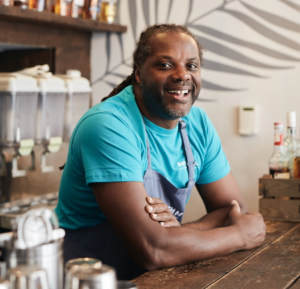
Delroy Dixon is the founder of Rhythm Kitchen (Credit: Rhythm Kitchen)
Delroy Dixon, 55, owns Rhythm Kitchen, a London-based Jamaican restaurant that ran a street food stall at the most recent Notting Hill Carnival.
“I used to go to Carnival back in the 80s,” he says. “So my first memories of it are of following the floats, listening to the sound systems and the smell of burning charcoal from people cooking, which would be reverberating right across the streets.
“Within the community, it’s [known as] that day of the year where you’re kind of just free.”
He recalls helping his brother out when he had a Notting Hill Carnival food stall back in the day, selling fried dumplings, curry goat and other Caribbean favourites.
But as a trained chef, with several years’ experience working in the industry, he always dreamed that one day he’d be the one cooking Caribbean food for a living.
“Caribbean food was always what I knew how to cook with a passion, because it’s where my family is from,” he says (his parents both came over from Jamaica in the 50s – Delroy’s dad hailing from St Elizabeth and his mum from Clarendon).
“A big pot of soup, rice and peas and stew chicken… that was what my mum would cook us on a Sunday,” Delroy adds.
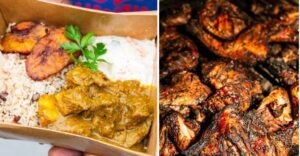
Rhythm Kitchen’s Caribbean food was served at Carnival last year (Credit: Rhythm Kitchen)
“We didn’t have a charcoal grill, so jerk wasn’t on the menu, and I wouldn’t say we had the likes of curry goat every week, because it was just something we couldn’t afford.
“But from a young age, I intuitively knew how to cook with the Caribbean spices in my mum’s cupboard, and as I got older, and had more disposable income, I took on a lot more Caribbean dishes and learnt to cook them myself.”
With such a passion for cooking and sharing Caribbean flavours, it’s unsurprising Delroy succeeded in his ambition to open his own restaurant, which serves the likes of salt fish fritters, chickpea doubles and fried dumplings, as well as modern iterations of Caribbean favourites, like a jerk chicken burger.
Plus, in 2019, Delroy had his full circle moment and returned to Carnival with his own food stall, bringing a selection of their most popular menu items to crowds.
“It was quite an experience,” he says. “A lot of people who go to Carnival… it might be the only time of the year they’re looking to eat jerk chicken or curry goat.
“From a personal perspective, it was great to see [people enjoying] some of the same food I would be eating on a Sunday.
“Caribbean food is often put on the back burner, but [it’s full of] heartening, homely dishes that taste really good.”
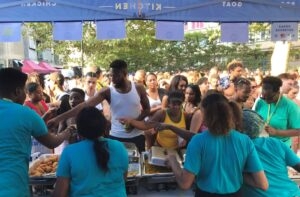
Food is a main event at Notting Hill Carnival (Credit: Rhythm Kitchen)
It’s pretty plain to see that Notting Hill Carnival street food is a huge part of the fabric of the weekend’s festivities – telling the stories of the generations that came before and celebrating their legacy.
If you’re heading down there this weekend, make sure to pick up a bite to eat, whether it’s jerk chicken, curry goat or a veggie roti.
Look for the queues, follow those delicious smells, and it’s sure to be some of the best Caribbean festival food the city has to offer.

.jpg_RVG9qi?tr=w-2560,f-webp,q-70)
.png_2XIXGj?tr=w-2560,f-webp,q-70)
.jpg_qa3BF9?tr=w-2560,f-webp,q-70)